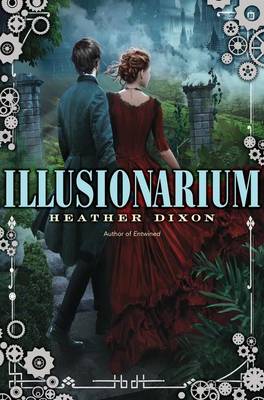Reviewed by Katie King on
**2.5 Stars**
I'm a little confused about Illusionarium, mostly because I was supposed to like it. I really enjoyed Heather Dixon's debut novel, Entwined, based on the story of the 12 Dancing Princesses. In fact, I was caught completely off-guard by how much I enjoyed it. It was beautiful, magical, and mysterious all at once. When I heard about Illusionarium and read the description, I figured I would enjoy it as well. It's simple logic. Dixon wrote Entwined. Entwined was really good. Dixon wrote Illusionarium. Why would Illusionarium not be really good? I fell into the classic trap.
Don't get me wrong, Illusionarium was interesting at first. The opening scene drew me in by painting some kind of arctic, steampunk society in the future. It was really cool (haha, puns). Jonathan and his family, especially his quirky mad scientist father, seemed like they would be a solid, engaging cast of characters. Unfortunately, after that first scene it all just fell apart, because the main problem is that the plot moves way too fast.
The plot moved at lightspeed, easily breaking the sound barrier. Every time I had just begun to understand what had happened in a scene, something new and important was happening. This left me feeling like I'm always trying to catch up, partly because scene transitions were non-existent. The whole book felt like someone made a Powerpoint and didn't include any slide transitions; just made you click and all of the sudden it's a completely different slide. Where are the appropriate breaks? Tying the scenes together? Making sure your audience knows what's going on??
Scene jumps (there has to be a more technical term for this), named after the abrupt manner in which new scenes were presented, were constant. I have no idea what kind of timeframe the book took place in. I'm not even exactly sure what period in time the book was set in, now that I think about it. The world is certainly complex, which I would have enjoyed, but it was only hashed out where necessary. If it didn't explicitly pertain to the plot, it wasn't explained or even mentioned. I was missing a lot of pieces of information, often confused, and was left with a very weak picture of the world. It didn't even need to be this way, either. At one point we learn so much about "Rivening" and Jonathan describes it in such detail that I could clearly picture it to the point of being disgusted. Throughout the whole book, that would have made for a much richer experience.
There was also quite a bit of what I called in my notes "Florel-ex-machina," Florel being both the antagonist and not (parallel worlds, yay!). I felt like there were quite a few times when developments were very convenient for the plot, with a lot of them having to do with Florel. For example, Jonathan learns about illusioning for the first time but is already some kind of natural and exceeds everyone else's power within a few days (weeks? months? who knows??). This tied a lot into being info-dumped on a lot for the purposes of getting all the information out, regardless of understanding. Maybe the thought process is if they throw so much at you at one time while speeding through the plot, you won't have time to notice the plot holes.
Finally, the characters really fell flat for me. Like I said, I thought things would be good based off of the first scene. But as the story progressed I realized I really had no idea who anyone was, just what role they played in the plot. The romance was the classic we-spent-time-together-so-of-course-were-in-love. Lockwood was purely the aggressive, relentless soldier with a soft side, kind of like Maximus the horse from Tangled. But who is he beyond that? I have no idea. Actually, I'm not even sure what most of the characters looked like either. For instance, I pictured Lockwood as some older, 40-year-old but then he fell in love with like a 15-year-old. Was she not like 15? Is Lockwood not in his 40s? Is that kind of thing just acceptable in this world or am I just wrong about their ages?
I loved Entwined and I really hope Dixon moves back towards that type of writing. I WANT to enjoy her books! Frankly, this just seemed like sloppy work to me. Something that was a fantastic idea, but got rushed to print.
Reading updates
- Started reading
- 14 August, 2015: Finished reading
- 14 August, 2015: Reviewed
